The Making of an Advocate
March 03, 2022
By Stephanie Rizzo ’09
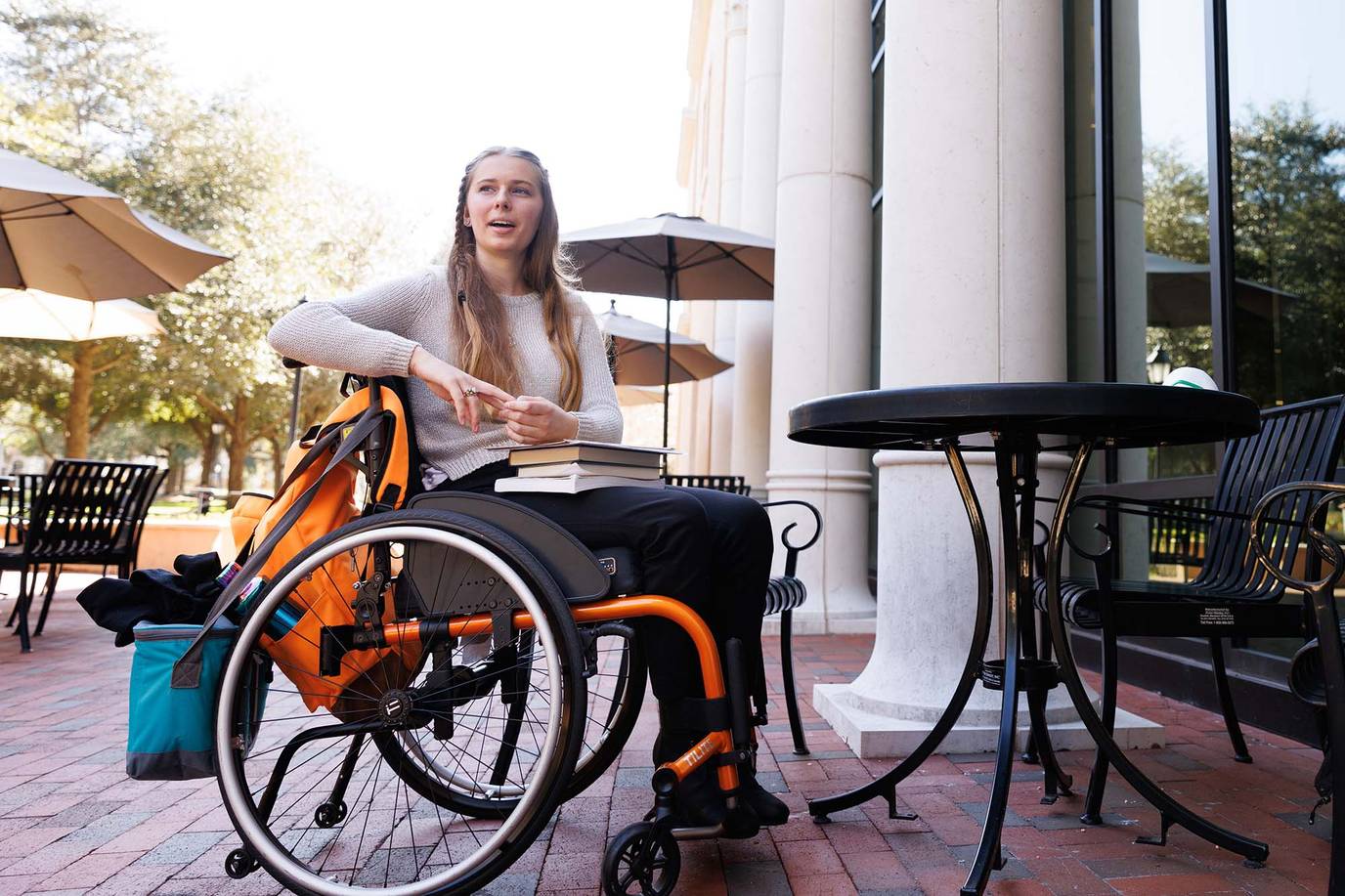
Elizabeth Smith ’22 ’24MPH came to Rollins wanting to embrace a new beginning. That all changed when the world was thrown into chaos. Now, she’s emerged from the pandemic as a fierce advocate for disability rights.
Many students experience a culture shock when they transition from high school to college, but some experiences are more challenging than others. Take communication studies and music double major Elizabeth Smith ’22 ’24MPH. The former homeschooler has a neurologic condition that significantly impacts her heart, making it difficult to stand and walk for extended periods, so she uses a wheelchair on days when she’s going to be out and about.
“Being homeschooled meant my environment was already adapted to me, regarding my stamina with getting around the house, so I didn’t have to use a mobility aid,” she says. “Going to college marked the first time in my life where I was using a wheelchair daily.”
Suddenly, Smith found herself encountering physical barriers she hadn’t anticipated. A loose brick in the road, for instance, can pose a major problem for people navigating the world in a wheelchair. Rollins’ Office of Accessibility Services addresses needs big and small and oversees efforts to create an all-around accessible campus, even offering personalized accommodations for disabled students, but for Smith, the problem was much more personal. She felt socially out of sync with her peers.
“From my perspective, people were treating me differently because I was in a wheelchair,” she says. “I don’t think they were intentionally trying to be hurtful, but rather that they didn’t quite know how to approach the topic of my disability or my needs.”
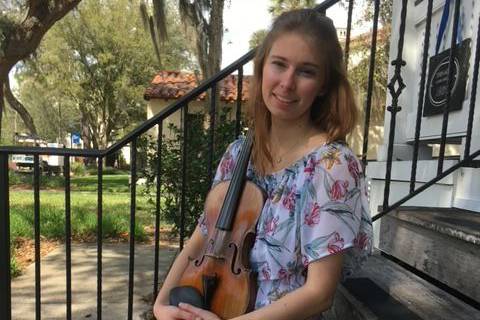
Facing Down Challenges
This phenomenon, known in communication studies as communication apprehension, is well-documented, says communication professor Sarah Parsloe, who worked with Smith on a research project this past summer through Rollins’ Student-Faculty Collaborative Scholarship Program.
“Communication apprehension often occurs in situations where people are trying to accommodate differences,” she says. “This applies to all sorts of cultural differences such as encountering someone who speaks a different language, or, in Elizabeth’s case, someone who is a member of the disability community. Most people mean well, but they don’t know exactly how to approach these topics. As a result, people can essentially over-accommodate or shut down communication altogether for fear of saying the wrong thing.”
Smith’s biggest challenge of all was the question of identity. While at home during her adolescent years, she avoided claiming her disability identity. When she came to Rollins, she had to face this aspect of herself, utilizing a mobility aid and navigating the social and physical challenges. Due to this overwhelming identity shift, Smith returned to campus in the fall of her second year pushing herself not to use a mobility aid. However, “abandoning” this aspect of her identity came with a price as her health declined. Then in spring 2020, the COVID-19 pandemic sent everyone home.
“Everything went virtual, and suddenly, I was at home again,” says Smith. “All of my infrastructure challenges vanished. I no longer had to worry about finding accessible parking or sticking out due to my wheelchair. I found that people in my classes were more willing to talk to me, and my stamina improved because I wasn’t trying to navigate campus or hide my disability.”
While the shift to virtual learning was valuable for Smith, she realized that it was a temporary measure. She began to imagine what it might mean to advocate for disability rights in anticipation of a return to in-person learning.
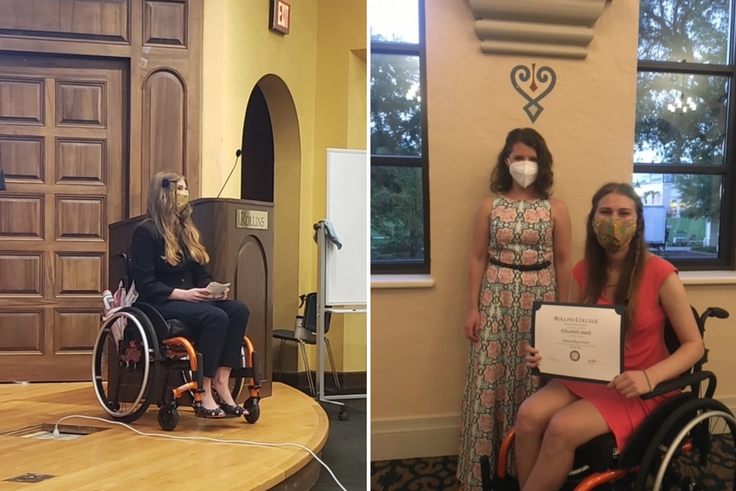
Liberal Arts in Action
Smith’s newfound energy meant she had more bandwidth for things like student organizations and opportunities outside the classroom. She joined the Student Government Association (SGA) and earned a virtual fellowship through the Global Livingston Institute, where she worked to improve public health outreach in Rwanda and Uganda. She also started thinking critically about her own identity, exploring what it means to be a disability advocate. What if she shifted her focus away from trying to hide part of her identity and leaned into her own experiences as a catalyst for change?
Enter the research project that Smith conducted with Parsloe, who realized that Smith's story, while deeply personal, perfectly illustrated the need for more options when it came to upping accessibility standards in higher education. So the pair got to work examining how the shift to virtual learning affected students with different abilities and how issues of accessibility are changing as the pandemic is changing.
Smith had already worked to pass SGA legislation related to accessibility as an Accessibility Senator during her junior year. She saw a summer research project as an opportunity to gather more data that could then be used to inform additional changes. On top of funding granted through the Student-Faculty Collaborative Scholarship Program, Smith and Parsloe received a grant from the Rollins Diversity Council.
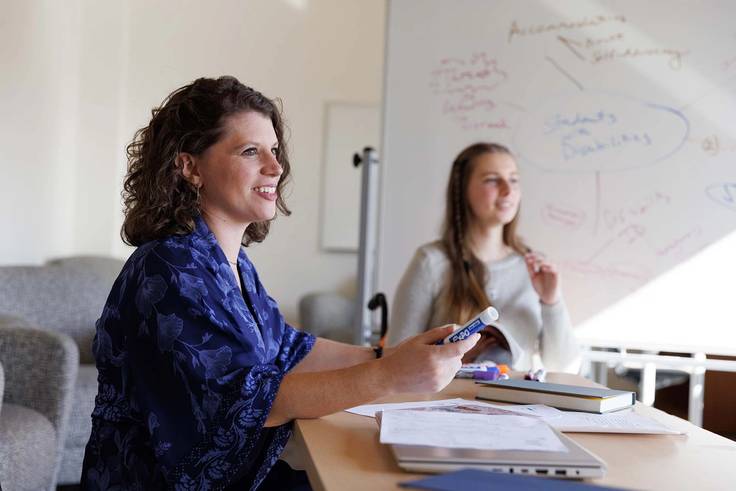
The Researcher as Subject
In summer 2021, Parsloe and Smith officially launched their research project, “COVID as a Catalyst: Shifting Experiences of Disability and (Mis)Fitting in the College Classroom.” They interviewed 16 students with physical, mental, and learning-based disabilities to better understand how issues of accessibility changed with and through the pandemic. Among the experiences recorded in the data? Smith’s own.
Smith and Parsloe’s research showed that students with disabilities commonly engage in something called masking, where they try to appear as nondisabled as possible. The tendency to appear “normal” often stems from environmental challenges and internalized ableism.
Though the pandemic was traumatic in many ways, it also had some unexpected positive effects in the way it normalized accommodations like virtual learning. Smith and Parsloe presented their findings at a poster-board session for Rollins’ Board of Trustees and at the Organization for the Study of Communication, Language & Gender (OSCLG) 2021 virtual conference. They intend to share their research at another upcoming conference and are planning to publish their work in an academic journal.
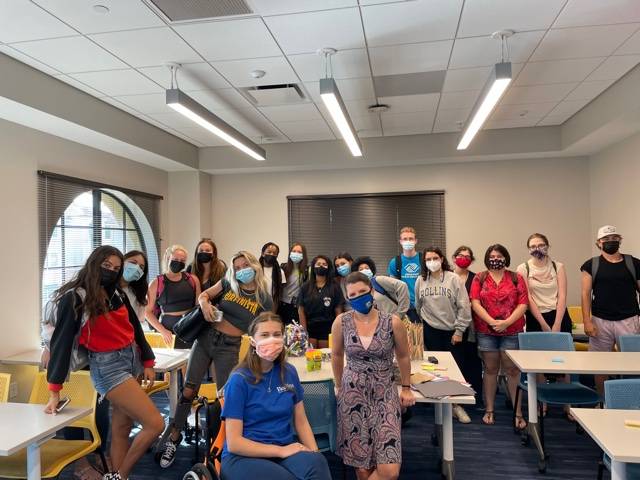
Looking Ahead
Since concluding their research, Parsloe and Smith have continued working together to address systemic issues of ableism in higher education and advocate for more inclusive policies. Smith has been a guest speaker and facilitator in Parsloe’s Rollins College Conference (RCC) course Disability and Social Change, where they worked with first-year students to plan the first-ever Rollins Disability Empowerment Week that kicks off March 7 (see event lineup below).
“The whole idea is to expose students to the idea of ableism—to get them to understand the ways in which ableism is embedded in our society, where it comes from, how it circulates in the language we use, and how it shows up in our actions,” says Parsloe.
Change is incremental, but Smith is in it for the long haul and credits Rollins for the freedom and opportunity to discover her passion. Smith is much more confident in her ability to speak on behalf of herself and her peers. She’s worked closely with Bethann Durlin, Rollins’ director of accessibility services, and has started brainstorming ways to create more inclusive spaces for students with disabilities at Rollins.
And it’s working. Smith, Parsloe, and Durlin recently campaigned to reinstate handicap parking that had been shut down due to construction, and the College worked with its contractors to make sure those spaces were safe and available. Some of the proposed changes include a disability ally training program, earmarking funds for infrastructure changes, and of course, launching yearly Disability Empowerment Week programming.
Smith has continued to expand her involvement at Rollins as she returned to campus her senior year, serving as the Student Life Chair for SGA, president of the Pre-Law Society, and a social media ambassador for Rollins’ Office of Marketing. Smith is a part of the inaugural class of Hamilton Holt School students pursuing an accelerated master’s of public health. This summer, she’ll continue to build her experience when she undertakes her master’s practicum with The Lifeboat Project, an organization dedicated to combatting human trafficking.
“Being involved in the conversation has helped a lot,” says Smith. “I feel supported, empowered, and that people are listening.”
Disability Empowerment Week
The goal of Rollins’ inaugural Disability Empowerment Week isn’t to confine the conversation to mere days. Rather, it’s meant to serve as a jumping-off point for continued discussion and greater visibility surrounding disability awareness. Parsloe, Smith, and students in Disability and Social Change have partnered with the Office of Accessibility Services to provide a week of programming that puts accessibility and allyship at the forefront.
Story Circle
March 7 | 4-5:30 p.m. | Faculty Club
The week kicks off with a story circle that’s open to all students. If you’re a Tar with a disability or an ally and would like to share your experience with your peers, this event provides a safe space to do so. Students who don’t identify as disabled are encouraged to attend, listen, and ask questions.
Book Talk
March 7 | 7-8 p.m. | Kathleen W. Rollins Hall, Room 300
Come listen to speakers Patricia Geist-Martin and Sarah Parsloe discuss their book, “Falling in Love with the Process: A Stroke Survivor’s Story” that focuses on stroke survivorship and resilience.
Raise the Disability Pride Flag
March 8 | 12:30-1 p.m. | Tars Plaza
Did you know that there’s an official flag representing disability pride? Designed by Ann Magill in 2019, the black flag with five zigzags represents how disabled people find creative ways to move around barriers, while the colors represent mental illness, intellectual and developmental disability, invisible and undiagnosed disability, physical disability, and sensory disability.
Dining in the Dark
March 8 | 5-8 p.m. | Kathleen W. Rollins Hall, Room 300
Presented in partnership with the Rollins Social Impact Hub and Lighthouse Central Florida, a nonprofit helmed by Kyle Johnson ’07 aimed at providing aid to those experiencing vision loss, this event invites students to enjoy a meal while completely blindfolded. Afterward, they’ll reflect as a group to determine how limited sensory ability hindered or enhanced the experience. Seating is limited, and all participants must RSVP.
Suggested $5 donation to Lighthouse Central Florida
Inclusive Dance Event
March 9 | 4-6 p.m. | Lakeside Movement Studio
Join Director of Dance Robin Gerchman and members of the Rollins Dance Association as they discuss inclusive ways to approach movement as expression. The session will conclude with a dance session meant to empower participants of all abilities.
Innovation Session
March 10 | 4-5:30 p.m. | Social Impact Hub
As the week winds down, students who attended any of the week’s programming are invited to this special session at the Rollins Social Impact Hub, where they can share what they’ve learned and pitch solutions to some of the challenges associated with disability on campus.
Film Screening: Crip Camp
March 10 | 6 p.m. | SunTrust Auditorium
The week caps with an event co-sponsored by the Rollins Democracy Project. Students, faculty, and staff are invited to a screening of Crip Camp, the award-winning documentary about the Disability Rights Movement. After the movie, stick around for a discussion with special guest Judy Heumann, who is known as “The Mother of Disability Rights.”
Read More
July 15, 2024
Rollins College Computer Science Professor Discusses AI and the Future of Work
Daniel Myers, an associate professor of computer science at Rollins College, provides expertise on how AI is changing the nature of work.
July 08, 2024
Gunter’s Book on Climate Change Receives Multiple Awards
Political science professor Mike Gunter’s book Climate Travels recently won awards from Foreword magazine and the American Library Association.
July 03, 2024
Rollins Welcomes Dean Lauren Smith
The 32789.com interviewed Lauren Smith, the new Dean for the Hamilton Holt School about her experience with adult education.
